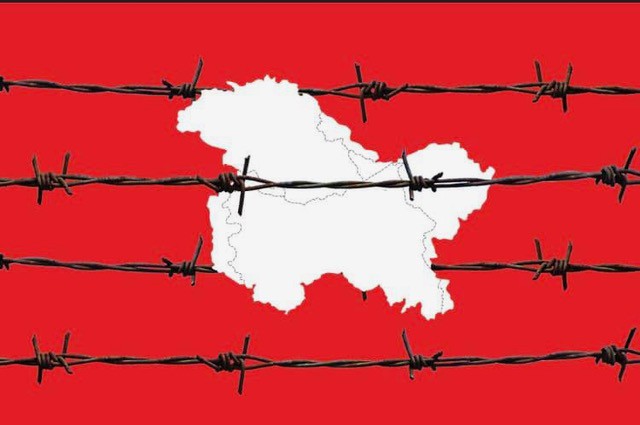Kashmir Is Heading to a Point of No Return
BRICS, 16 Dec 2019
Naveed Mehmood Ahmad | Countercurrents – TRANSCEND Media Service
12 Dec 2019 – The crackdown on the mainstream leadership in Jammu and Kashmir and the inability of the present dispensation, to take into confidence the Abdullah’s and the Mufti’s, is deeply problematic. The political doctrine that has been operating in Kashmir since 1947 has now been challenged. Using a ‘not so friendly’ mainstream leadership, to check separatist politics, was one compromise Delhi had to make. Even the ‘truest Indians’ and trusted allies of Delhi, Farooq Abdullah & Mufti Sayed, harnessed ambitions of ‘autonomy’ and ‘self-rule’. But putting up with them allowed Delhi, control over the state and ensured some semblance of public participation in the mainstream political activity.
This doctrine presumed, rightly so, that weakening of mainstream politics will only make the separatist movement stronger. But the current policy, or the lack of it, is showing blatant disregard to the established norms of operating in Kashmir. While it hopes that an alternative leadership will come up, absence of any separatist sentiment therein, cannot be guaranteed.
The process of creating alternative to the current National Conference and Peoples Democratic Party leadership started long back. Talks of a third front had gained momentum in months preceding the August 5 decision. Several non-NC and non-PDP leaders/political activists were precipitously made relevant over the last couple of years. Thanks to the assistance by mainstream media, their names are now taken alongside Farooq, Omar and Mehbooba as ‘leaders’ of Jammu and Kashmir. They perhaps were (or maybe still are) pegged to be ‘the alternative’.
But events leading up to the August 5 decision and after, showed that it is very difficult to find a clean slate in Kashmir. The attempt of showing the ‘silver lining’ to the second rung leadership of Kashmir doesn’t seem to be working. While chief ministerial positions and cabinet ranks may be alluring , the conundrum on the nature of politics would subsist.
A compromise, on the credentials of these ‘alternative leaders’, will again have to be made. This was established, when the present dispensation failed to break, into submission, most of the political leaders including those from the ‘alternatives’. We may now have made the Abdullah’s and Mufti’s irrelevant, but the alternatives are, in effect, the same people with the same political tricks under their sleeves. The problem, though is that they may not be as popular as the former.
With every passing day, when the mainstream is disabled in Kashmir, the separatist movement is gaining. Pertinently, today’s separatist movement is also leaderless. But unlike mainstream politics, separatism is benefitting from it. Decentralization of the separatist leadership has allowed its politics to consolidate and permeate into the edifice of the Kashmiri society. This wasn’t the situation with a centralized separatist leadership, controlled by a couple of individuals. It allowed, multiple forces in Kashmir and Delhi, to carry out political maneuvering in crunch situations.
A rudderless policy may lead Kashmiri politics to a point of no return, with Khalida Shah recently calling for unity amongst leaders, including the separatists. While the Government, in order to restore political processes, may be willing to redo a ‘1996 election’, they do not have a Farooq Abdullah on their side, or do they?
_______________________________________________
Naveed Mehmood Ahmad has a Masters in Law and is currently working as a legal research fellow in New Delhi.
Go to Original – countercurrents.org
Tags: Asia, BRICS, Conflict, Culture, Geopolitics, Hinduism, History, Human Rights, India, Indigenous Rights, International Relations, Islam, Kashmir, Pakistan, Politics, Religion, Social justice, Solutions, State Terrorism, Terrorism, Violence, War
DISCLAIMER: The statements, views and opinions expressed in pieces republished here are solely those of the authors and do not necessarily represent those of TMS. In accordance with title 17 U.S.C. section 107, this material is distributed without profit to those who have expressed a prior interest in receiving the included information for research and educational purposes. TMS has no affiliation whatsoever with the originator of this article nor is TMS endorsed or sponsored by the originator. “GO TO ORIGINAL” links are provided as a convenience to our readers and allow for verification of authenticity. However, as originating pages are often updated by their originating host sites, the versions posted may not match the versions our readers view when clicking the “GO TO ORIGINAL” links. This site contains copyrighted material the use of which has not always been specifically authorized by the copyright owner. We are making such material available in our efforts to advance understanding of environmental, political, human rights, economic, democracy, scientific, and social justice issues, etc. We believe this constitutes a ‘fair use’ of any such copyrighted material as provided for in section 107 of the US Copyright Law. In accordance with Title 17 U.S.C. Section 107, the material on this site is distributed without profit to those who have expressed a prior interest in receiving the included information for research and educational purposes. For more information go to: http://www.law.cornell.edu/uscode/17/107.shtml. If you wish to use copyrighted material from this site for purposes of your own that go beyond ‘fair use’, you must obtain permission from the copyright owner.
